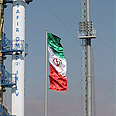
The satellite prior to its launch
Photo: AP
Iran has launched its first satellite in a step that has important symbolism but does not itself alter the strategic balance in the region, a US national security official said on Tuesday.
"The satellite technology they have deployed is probably not state of the art, but for the Iranians this is an important symbolic step forward," the official said, speaking on condition of anonymity.
Lost in Space?
Former head of Israel's Space Agency says Iranian satellite poses no intelligence threat but use of ballistic missile to send it into orbit does; adds satellite project meant to mask real goal of arming missiles with nuclear warheads
US and British officials said the Iranian satellite program may use technology that could be used for ballistic missiles, and noted the United Nations has sought to discourage Iran's nuclear and missile programs. Iran has long said its nuclear program is purely for civilian energy purposes.
"That's of grave concern to us," State Department spokesman Robert Wood told reporters of the satellite.
British Foreign Office Minister Bill Rammell said the launch "underlines and illustrates our serious concerns about Iran's intentions," adding it sent the "wrong signal to the international community."
It is unclear what Iran intends to use the satellite for, and the United States is still trying to learn more about it, the US security official said.
However, asked if the launch could have a strategic or tactical impact on the region, the official said, "this particular satellite launch does not appear to be a game changer at all."
He said the satellite was in a low orbit and noted that some satellites last only a short time aloft. "This one may fit into that category," he said.
In the first foreign reaction, France expressed concern because the technology used was "very similar" to that employed in ballistic missiles.
"We can't but link this to the very serious concerns about the development of military nuclear capacity," foreign ministry spokesman Eric Chevallier said in Paris.
Ahmadinejad said the satellite carried a message of "peace and brotherhood" to the world and dismissed suggestions that Iran's space program had military goals.
"We have a divine view of technology unlike the dominating powers of the world who have Satanic views," he said.
In Addis Ababa on the sidelines of an African Union summit, Iranian Foreign Minister Manouchehr Mottaki said the satellite would enable Tehran to receive "environmental data," adding that "the technological capacity of Iran is meant to meet the needs of the country."
Ahmadinejad has made scientific development one of the main themes of his presidency, asserting that Iran has reached a peak of progress despite international sanctions and no longer needs help from foreign states.
The state news agency IRNA said the satellite would take orbital measurements and would circle the Earth 15 times every 24 hours.
Reuters and AFP contributed to this report















